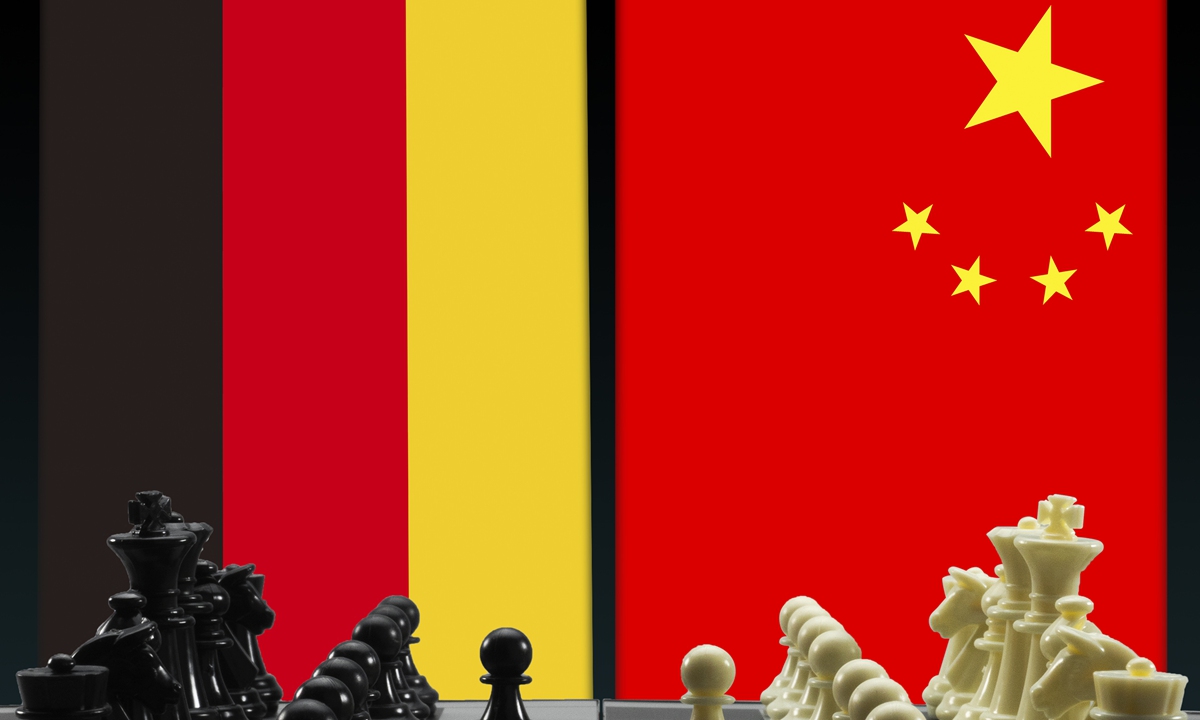Germany’s repeating rhetoric of ‘overdependence on China’ mirrors its impracticality

China-German Photo: VCG
Germany's economy ministry is considering a range of measures to make business with China less attractive as it seeks to reduce its dependency on its major trading partner, according to a Reuters report. Sources familiar with the matter revealed that the measures may include reducing or even scrapping investment and export guarantees to China in addition to reducing participation in trade fairs and scaling basic training for local employees.
There have been ongoing discussions in Germany about "overdependence on China," especially since Scholz assumed office. Despite the impact of the COVID-19 pandemic and the Russia-Ukraine conflict on Germany's concerns about the security of its industrial and supply chain, its economy ministry's consideration over measures is essentially related to a policy shift away from China.
It's legitimate for a country to be concerned about its high level of external dependence and long-term economic security. However, it is unrealistic to unilaterally emphasize a so-called "decoupling." After all, China and Germany cannot be decoupled considering the strength of two-way economic ties. It's understandable for Berlin to assess adjusting and diversifying the supply chains in order to safeguard the stability. What is unacceptable to China is using "reducing dependency on China" as a pretext of "decoupling" while accusing China of being "unreliable," which is a discriminatory and targeted attack on a major trading partner.
The various approaches the Scholz administration has taken against China since it came to power are in part due to the fact that Germany is subject to many limitations as a country.
First, Germany is an economy with a particularly high degree of external dependence, both in terms of exports of production and imports of raw materials and energy. This kind of economy is very sensitive to changes in the global political and economic environment but is not capable of influencing the whole picture. So when the Russia-Ukraine conflict broke out, Germany's export oriented economy was left particularly vulnerable.
Coupled with the recent tensions in the Taiwan Straits that have led to rising uncertainty about a conflict between China and the US, Germany is not optimistic about the future of the global economy. Therefore, the German government has remained cautious in managing companies' dependence on the Chinese market, saying that in the event of a conflict or even a war between China and the US, entrepreneurs will suffer and Germany's industrial chain may be fractured. The German government's logic is based on a pessimistic view of the future, in particular, the future of the Asia-Pacific region, or to say China, amid the "strategic competition" between China and the US. After the tension in the Taiwan Straits, it could not resist accelerating the pace of "reducing dependence on China."
Second, even if Berlin is not completely controlled by Washington, Germany is, after all, a member of the Western world. Differences in values and political identity will eventually ferment a natural distrust of China. Particularly under the circumstances with low expectations of the future, Germany prefers to retain business relations with its traditional allies and partners, even though it may not be as beneficial as that with China. Unlike Washington, Berlin has neither the desire or ability to compete with China on all fronts. But it is caught in the middle of a major power rivalry, it will naturally side with the West and remain risk-averse.
The political performance of the current German coalition government also shows that it is not a pragmatic administration, as the three governing parties have conflicting interests and their own values. The diversity of interests also makes it difficult for the government to implement a unified and stable policy toward China. Moreover, Western governments, including the Scholz administration, lack a comprehensive understanding of China and a weak grasp of its development prospects and current policies.
After almost a year in office, Scholz, during his four-year term, has so far failed to lead the coalition to formulate a rational and lasting foreign policy, including one toward China. When cognition doesn't keep up with reality, Germany's China policy increasingly appears full of hesitancy, contradictions, and impracticality.
The author is a professor at the School of International Relations of Beijing Foreign Studies University. opinion@globaltimes.com.cn

